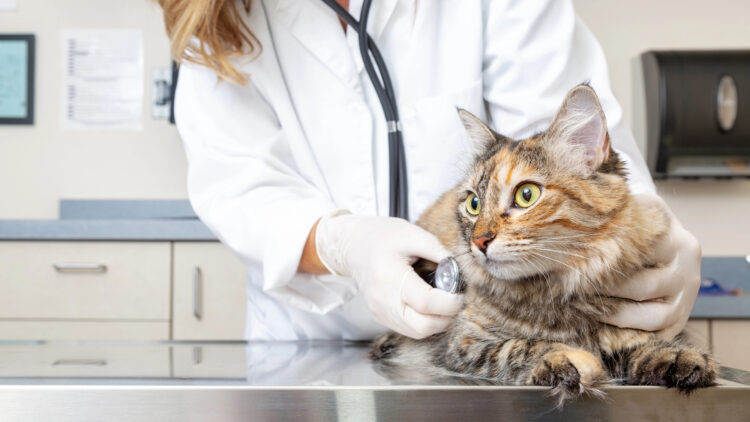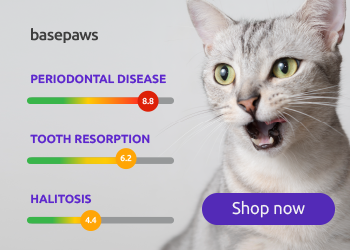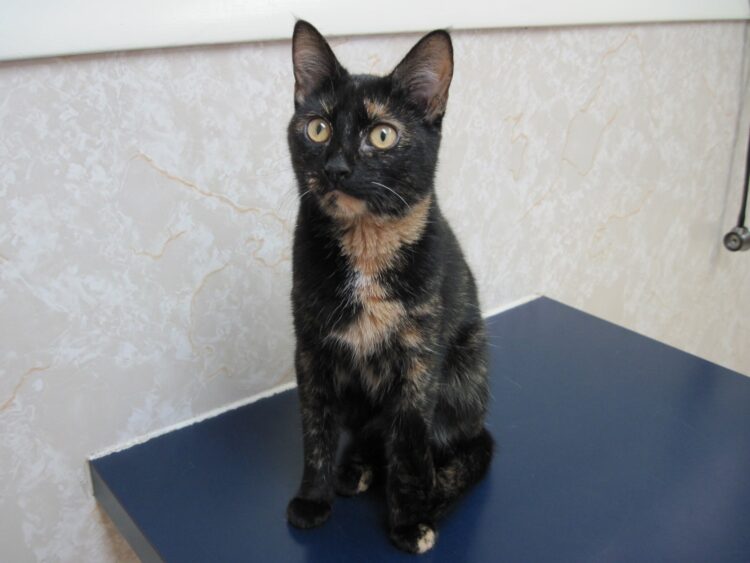
Over the last few years, the veterinary profession has undergone profound changes. The days of the neighborhood vet may be numbered as more and more practices are being bought by large corporations. An unprecedented number of veterinarians is leaving the profession, and the veterinary profession consistently has one of the highest suicide rates. These changes will affect you and your cat in various ways, if they aren’t already.
A shortage of veterinarians
More people than ever before share their lives with a pet, driven partially by increased adoptions during the pandemic and more options for people to work from home. As a result, vets are busier than ever, working longer hours, and seeing more patients. For many vets, that means a loss of work life balance. These pressures lead to changes in how vets work, with some vets shifting to part time work, others leaving private practice to work for pharmaceutical companies, going into research, or leaving the profession altogether. Additionally, veterinary medicine is becoming increasingly specialized, leading to fewer general practice vets.
Generational shifts are also impacting the availability of veterinarians. Each generation has different attitudes about work ethic and work life integration. Millenials, for example, place a higher value on a healthy work life balance than previous generations. “For many of these younger vets, it doesn’t seem to be a vocation anymore,” says Dr. Andrea Tasi, a holistic housecall vet and owner of Just Cats, Naturally. “It’s a job.”
Dr. Tasi feels that increased pet ownership is not the only driver for the need for more vets. “More and more animals are staying with their owners longer, which means that more and more chronic disease treatments will be necessary.”
Veterinary medicine is a business
People often accuse vets for “being in it just for the money.” Nothing could be further from the truth. The average veterinarian graduates with a whopping $150,000 in student loan debt. According to the Bureau of Labor Statistics, the average median veterinary salary in 2019 was $95,000. By comparison, the average median salary for a physician in 2023 was $236,000. While most veterinarians go into their profession because they care about animals and want to help them, they also have to support themselves and their families. Even if they wanted to, they couldn’t give their services away for free.
Just like any other business, veterinarians have overhead. They have to pay rent, utilities, and staff salaries. They have to purchase supplies, medications and equipment. They have to pay for laboratory analysis by an outside lab, or maintain an in house laboratory.
Enter corporate veterinary medicine
in the US and other countries, corporations and equity funds have been buying up smaller practices. According to The Atlantic, veterinary insiders now estimate that 25 to 30% of practices in the US are under large corporate umbrellas. For specialty clinics, that number is closer to three out of four. Mars, Inc. (yes, the candy company) is the largest owner of stand-alone veterinary clinics in the US with more than 3,000 clinics worldwide.
Corporate ownership in the UK is even higher than in the US. According to The Atlantic, even the clinic owned by James Herriott, the author of the beloved All Creatures Great and Small books, is owned by a corporation.
Cat parents often won’t even know that their veterinary clinic was bought out because most corporate-owned practices will retain the original practice name. What they probably will notice are higher fees, since now the fees not only have to pay for the above mentioned overhead, but they also need to pay the corporate administrative staff, not to mention generate profits for the shareholders and board members of these companies.
While your cat will probably still receive a high level of care at a corporate owned practice, you may see significant turnover of both veterinarians and support staff. Older, experienced vets especially may not want to work under a corporate structure.
Dr. Tasi says that she frequently hears her clients complain about a lack of communication about why tests are necessary and about receiving results in a clear and timely manner from corporate owned practices. “They run all these tests, but nobody can tell me what’s wrong with my cat” is what her clients tell her.
Corporate practices are almost always multi-doctor practices, and often, the vet on duty who is communicating lab results has never seen the feline patient. “Committed follow through takes a committed practitioner,” says Dr. Tasi.
Ellen Carozza, LVT, VTS (CP-Feline,) a veterinary technician with 30 years experience, has experienced the changes a buy out brings to a practice more than once over the course of her career. “It depends on who buys the practice, and if the people they put in positions of power actually know how veterinary medicine works,” she says. “Corporate vet med is not about pet care, it’s about how many hospitals they can buy and how to make a profit, versus quality, which is what we all want.” Her experience has been that corporate owned practices hire fast, and they often hire untrained assistants instead of credentialed veterinary technicians. “We cost more,” says Ellen. She also feels that corporations don’t give enough opportunities to credentialed technicians to be trained for management positions. “Credentialed techs know and breathe veterinary medicine,” says Ellen. “These corporations need to stop hiring financial graduates to manage people.”
Access to veterinary care
Of all of these changes, reliable and timely access to veterinary care is probably the biggest challenge for cat parents. Wait times to get routine care appointments are often as long as two to three weeks. “Most of the complaints I hear from my clients when they’re looking for conventional care is that they can’t get an appointment for two weeks or longer for non-urgent issues,” says Dr. Tasi, “or they complain that the vet they liked is no longer at the practice.”
Even access to emergency care can be difficult. Dr. Tasi has had clients who had to drive 50 miles to find an emergency clinic who would see their cat. These issues are compounded in smaller towns or rural areas with fewer veterinarians.
What can cat parents do to navigate these changes?
“Do your homework,” says Dr. Tasi. Get to know your local veterinary clinic, and the vets and support staff who take care of your cat. The advice I offered in my post How to Choose a Cat-Friendly Vet applies to vetting (pun intended) your existing practice as well. Don’t be afraid to ask questions about ownership.
If you want to be sure that your cat’s vet has the autonomy to make his or her own decisions about your cat’s care, rather than following corporate protocols, look for an independent clinic and support these small businesses before they disappear forever. “My independent streak and my desire to do what is right for each individual cat would make me a problematic employee,” admits Dr. Tasi.
For more about this topic, I encourage you to visit Champion of My Heart, a blog written by Roxanne Hawn, a Colorado based writer, and read her 2024 Veterinary Consolidation Update.
Image Depositphotos








“It depends on who buys the practice, and if the people they put in positions of power actually know how veterinary medicine works,” she says. “Corporate vet med is not about pet care, it’s about how many hospitals they can buy and how to make a profit, versus quality, which is what we all want.”
I have seen this business practice ruin numerous manufacturing companies as well, quality control cost too much, drive up the share price in the short term resulting in low quality products; I despise investment outfits and what they do
The dentist office I used to go to was bought out by a corporate entity. I switched to a very good family run practice.
We switched veterinarians 3 years ago from one that was beginning to be run like a corporate entity, (don’t know if they were but the business practice were similar).
Our new vet is family run, they are very skilled, services are excellent and pricing is reasonable; I sure want to support that.
I hate it. My dental vet sold his practice to his partner. He only did dental. He said online he was not about to sell his practice to one of those companies. Blue Pearl brought at VSH, all of the owners are millionaires. Blue Pearl is horrendous. I had to take my girl for MRI, kept getting delayed, they lost my dog, said I never brought her in. Told me to get out. After almost 2 hrs, someone brought her around from the back, her mouth was bleeding, they destroyed her teeth. I did a review on fb. The CEO called me at home and threatened me if I did not remove the review he would sue me for libel. I think it was MARS that brought out Petsmart or Petco veterinary practice. I know they both sold their practices and started new ones in their stores. I went to VEG recently. At first I thought it was great, as the nite wore on, I began to have questions. They did ultrasound which I found out later was only a partial, semi one. Did bloodwork, xray. 6-11and still no definitive answer. Meds they gave my dog made her worse, told me there were spots liver and gallbladder tgat looked like cancer. Probiotics they told me to get, caused my dog to have explosive bowels. Never gave me estimate, bill was over 1600. And then because of their errors had to have everything done by my vet, so another 800. They were nice but I will never go back. It is so hard to find ER when you need it. I hope to never have to go to the NC Vet School, no good experiences and 1 fatal one. I don’t know what is going to happen, I guess it will change like human drs had to join big conglomerates.
I’m sorry you had such horrible experiences, Sandy.
Ingrid – Belated congratulations on your 10th anniversary of being a certified veterinary journalist!
Thank you, Abby!
My local vet that I’ve been going to for 30 years has been bought by 4 of the vets that work there. The practice is so big it takes 10 min or more to get thru on the phone. They answer and then put you on hold forever. If you need an emergent visit they tell you to go to an emermency practice. It is so frustrating!
Sadly, your experience mirrors what I hear from so many others.
Thank GOD our Veterinary practice is still privately owned and THRIVING!!!!! They have been in business over 50 years, we realize we are blessed. That being said, they hired new front office receptionists that aren’t nearly as friendly as the old staff was (We have been clients for over 20 years!)
You are lucky, Caren!
Independent vet hospitals often sell to corporations when they want to get out of the business, or at least out from under the all consuming nature of running a practice day to day, everyday. Seeing turn over isn’t necessarily from the fact that it is now corporate owned but from the practitioners wanting to move on and new vets bringing on their own staff. And then from making sure the staff work well together
I have gone to private practices that were all about running every test they could regardless if the answers would change the treatment.. and I’ve been to corporate owned practices that were kind and thorough but it wasn’t all about padding the bottom line. What matters is culture how a place is run, not who owns it.
Yes, prices are going to increase… they do everywhere. Increases at the vet isn’t personal or about making more money, it’s about staying in business so that you have a vet to rely on.. (and don’t get me started about costs at emergency clinics)
For most vets, selling to a corporation is the only way they’re going to be able to retire.
My vet of 20 years had sold her clinic but I was able to keep seeing her. Now she is retiring so I am going to switch to a university vet school based clinic. We have already tried them & I was quite happy with their service. We are lucky that we live in a big city that has one of these clinics.
That’s great that you have that option, Michelle.
We saw a big change in prices and staff at one clinic we went to years ago. Then I found out they had been sold. The clinic I go to now is a family owned clinic and I sure hope they don’t get sold. We love our vet, but it is so hard to get an appointment because his client list has gotten so big.
I hope your vet continues to be family owned, Janine.